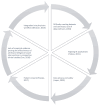Artificial Intelligence in IVF Laboratories: Elevating Outcomes Through Precision and Efficiency
- PMID: 39765654
- PMCID: PMC11727220
- DOI: 10.3390/biology13120988
Artificial Intelligence in IVF Laboratories: Elevating Outcomes Through Precision and Efficiency
Abstract
Incorporating artificial intelligence (AI) into in vitro fertilization (IVF) laboratories signifies a significant advancement in reproductive medicine. AI technologies, such as neural networks, deep learning, and machine learning, promise to enhance quality control (QC) and quality assurance (QA) through increased accuracy, consistency, and operational efficiency. This comprehensive review examines the effects of AI on IVF laboratories, focusing on its role in automating processes such as embryo and sperm selection, optimizing clinical outcomes, and reducing human error. AI's data analysis and pattern recognition capabilities offer valuable predictive insights, enhancing personalized treatment plans and increasing success rates in fertility treatments. However, integrating AI also brings ethical, regulatory, and societal challenges, including concerns about data security, algorithmic bias, and the human-machine interface in clinical decision-making. Through an in-depth examination of current case studies, advancements, and future directions, this manuscript highlights how AI can revolutionize IVF by standardizing processes, improving patient outcomes, and advancing the precision of reproductive medicine. It underscores the necessity of ongoing research and ethical oversight to ensure fair and transparent applications in this sensitive field, assuring the responsible use of AI in reproductive medicine.
Keywords: IVF laboratory; artificial intelligence; outcomes; quality assurance; quality control.
Conflict of interest statement
The authors declare no conflicts of interest.
Figures
References
-
- Chavez-Badiola A., Farias A.F., Mendizabal-Ruiz G., Silvestri G., Griffin D.K., Valencia-Murillo R., Drakeley A.J., Cohen J. Use of artificial intelligence embryo selection based on static images to predict first-trimester pregnancy loss. Reprod. Biomed. Online. 2024;49:103934. doi: 10.1016/j.rbmo.2024.103934. - DOI - PubMed
-
- Papamentzelopoulou M.S., Prifti I.N., Mavrogianni D., Tseva T., Soyhan N., Athanasiou A., Athanasiou A., Athanasiou A., Vogiatzi P., Konomos G., et al. Assessment of artificial intelligence model and manual morphokinetic annotation system as embryo grading methods for successful live birth prediction: A retrospective monocentric study. Reprod. Biol. Endocrinol. 2024;22:27. doi: 10.1186/s12958-024-01198-7. - DOI - PMC - PubMed
-
- Kaya F., Aydin F., Schepman A., Rodway P., Yetişensoy O., Demir Kaya M. The Roles of Personality Traits, AI Anxiety, and Demographic Factors in Attitudes toward Artificial Intelligence. Int. J. Hum.-Comput. Interact. 2024;40:497–514. doi: 10.1080/10447318.2022.2151730. - DOI
Publication types
LinkOut - more resources
Full Text Sources



